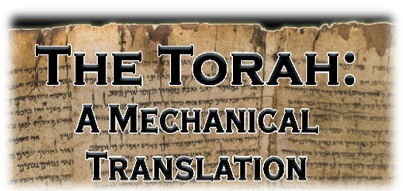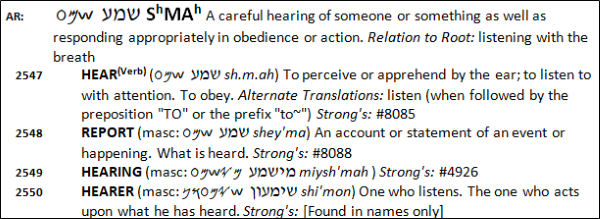 By Jeff A. Benner Navigating through this translation is fairly simple and straight-forward. Let’s use Deuteronomy 6:4 (Figure 1) as an example.  Figure 1 Words written in all upper case are Hebrew words. In Deuteronomy 6:4 we have the words “HEAR,” which is a verb, and the word “UNIT.” In order to look up the word “HEAR” in the lexicon, first look this word up in the Concordance (Figure 2).  Figure 2 After the word “HEAR” is the number 2547, followed by all of the verses in the Torah where this word appears. Next we look up the number 2547 in the lexicon ( Figure 3).  Figure 3
Hear we have the word “HEAR,” how this word is written in Paleo-Hebrew (  Figure 4 Let’s go back to Deuteronomy 6:4. Preceding the word “HEAR” is “!(ms)~.” When we look this up in “Prefixes, Suffixes and Verb Conjugations” (Figure 5), we find the following meaning for this symbol; “Identifies the verb as a feminine plural imperative.”  Figure 5 Hebrew names are written with only the first letter of the word in uppercase letters, such as with the word “Yisra’eyl” in Deuteronomy 6:4. To find the meaning of a name, we look the name up in “Hebrew Names” (Figure 6) where we find that the spelling of this name in Paleo-Hebrew, Modern Hebrew and transliteration. This is followed by a Mechanical Translation of the name (he~ will~ TURN.ASIDE(Verb)), a revised translation of the name (He turns El aside) and its Strong’s number (3478).  Figure 6
Also found in this verse is the name YHWH, which is the four-letter name of God that is often pronounced Yahweh, Jehovah, Yehovah, etc. Because of the uniqueness and importance of this name it is written in bold letters and all uppercase letters.
 Figure 7
If you are learning Hebrew, the format of this translation will assist you in determining the morphology of each Hebrew word in the Torah. After the word “Elohiym~us” in Deuteronomy 6:4 is how this word appears in the Hebrew Bible (אֱלֹהֵינוּ). When we look up the name “Elohiym” in “Hebrew Names” we find that this word is written as אלהים. So the word, as it appears in the Hebrew Bible is אלהים (the ם is dropped from the word, which is explained in “About the Hebrew Language” and is due to this word being a construct) plus the suffix נו meaning “us.” This word can literally be translated as Elohiym (אלהי) of us (נו) or, as we would normally translate it into English, “our Elohiym.”
 Figure 8 To learn more about the details of this translation, please read “About the Mechanical Translation” and to learn more about the Hebrew language read “About the Hebrew Language.
|




 ), Modern Hebrew (שמע) and in transliteration (ShMAh). This is followed by its definition, alternate translations found in the Mechanical Translation and its Strong’s number. As the Hebrew language is a root oriented language and all of the words that are derived from a root will be related in meaning. Therefore when doing a word study, it is recommended that you study the root of the word, in this case it is the Adopted Root שמע, along with all of the words that are derived from that root. You can also go even further into your study by studying the Parent Root of שמע (ShMAh), which is שם (ShM), by going up the page (Figure 4). Then by looking at all of the different roots and words that are derived from this Parent Root you will have a much better idea of what “HEAR” means within the context of the Hebrew vocabulary.
), Modern Hebrew (שמע) and in transliteration (ShMAh). This is followed by its definition, alternate translations found in the Mechanical Translation and its Strong’s number. As the Hebrew language is a root oriented language and all of the words that are derived from a root will be related in meaning. Therefore when doing a word study, it is recommended that you study the root of the word, in this case it is the Adopted Root שמע, along with all of the words that are derived from that root. You can also go even further into your study by studying the Parent Root of שמע (ShMAh), which is שם (ShM), by going up the page (Figure 4). Then by looking at all of the different roots and words that are derived from this Parent Root you will have a much better idea of what “HEAR” means within the context of the Hebrew vocabulary.
